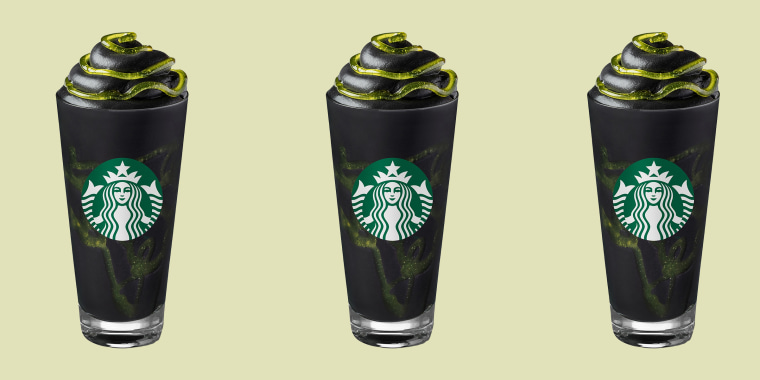An eerie new drink at Starbucks is turning plenty of heads and, quite possibly, a few stomachs.
The Phantom Frappuccino debuted at Starbucks cafes throughout Europe, the Middle East and Africa last week. The thick, black drink that's drizzled with green shimmery goo is basically as dark as the famous Unicorn Frapp was bright.
While the drink looks pretty lethal, it actually has a tropical taste. According to Starbucks, the vegan blended beverage is made with coconut milk, mango flavoring and trendy ingredients like charcoal powder (to create the black hue) and spirulina (for the slime).
But is something so unusual looking actually safe to drink?
Charcoal is used in many products — from food to toothpaste and even face wash — and it even has purported health benefits. Supplement companies say that charcoal may help prevent hangovers, decrease gas, reduce indigestion and diarrhea and cleanse toxins in the body — but the evidence for many of these claims is insufficient.
When it comes to modern medicine, however, activated charcoal does have at least one very important use. According to the National Capital Poison Center, it's used to stop poisons or drugs (often from an overdose) from being absorbed into one's bloodstream and gut. Though it's tolerated well by many, some may experience adverse effects from the gritty texture.
But those cleansing benefits may come with some unwelcome side effects.
After the Phantom Frappuccino launched across the pond, some tweeters made it a priority to warn Starbucks fans about the possible side effects of consuming charcoal, which can include weakening the strength of other prescribed medications, rendering them ineffective.
"If you are taking any other medicine, do not take it within two hours of the activated charcoal. Taking other medicines together with activated charcoal may prevent the other medicine from being absorbed by your body," according to the Mayo Clinic. Doses usually range from 10 grams (for babies) to 100 grams (for adults). Depending on the size, a Starbucks spokesperson told TODAY Food each Phantom Frappuccino has 0.8 to 1.6 grams of activated charcoal per drink and specified it's only enough to achieve black coloring.
According to Nathan Arnold, a press officer for the U.S. Food and Drug Administration, the FDA "has no food additive or color additive regulation for the use of activated charcoal as an ingredient in food."
If restaurants or cafes use charcoal to either color or flavor a dish, they are required to ensure that the charcoal used is of a food-grade quality.
Of course, the Phantom Frapp isn't the only charcoal-infused beverage or food out there.
Burger King made a splash in Japan with its first black burger in 2014. Those were made with a squid ink sauce and a charcoal-infused black bun. Charcoal-infused ice creams surged in popularity in the summer of 2017. TGI Friday's even got in on the gothic action, crafting a charcoal cocktail in honor of Black Friday.
While many who enjoyed the dark drinks and food offerings claimed they were tasty despite the fact that they turned people's mouths black, they often came with a surprising side effect that was only obvious after the meal was digested.


